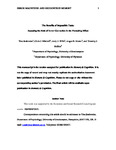The Benefits of Impossible Tests: Assessing the Role of Error-Correction in the Pretesting Effect
| dc.contributor.author | Seabrooke, T | |
| dc.contributor.author | Mitchell, Chris | |
| dc.contributor.author | Wills, Andy | |
| dc.contributor.author | Inkster, A | |
| dc.contributor.author | Hollins, Timothy | |
| dc.date.accessioned | 2021-07-22T15:55:27Z | |
| dc.date.issued | 2021-08-06 | |
| dc.identifier.issn | 0090-502X | |
| dc.identifier.issn | 1532-5946 | |
| dc.identifier.uri | http://hdl.handle.net/10026.1/17367 | |
| dc.description.abstract |
<jats:title>Abstract</jats:title><jats:p>Relative to studying alone, guessing the meanings of unknown words can improve later recognition of their meanings, even if those guesses were incorrect – the pretesting effect (PTE). The error-correction hypothesis suggests that incorrect guesses produce error signals that promote memory for the meanings when they are revealed. The current research sought to test the error-correction explanation of the PTE. In three experiments, participants studied unfamiliar Finnish-English word pairs by either studying each complete pair or by guessing the English translation before its presentation. In the latter case, the participants also guessed which of two categories the word belonged to. Hence, guesses from the correct category were semantically closer to the true translation than guesses from the incorrect category. In Experiment 1, guessing increased subsequent recognition of the English translations, especially for translations that were presented on trials in which the participants’ guesses were from the correct category. Experiment 2 replicated these target recognition effects while also demonstrating that they do not extend to associative recognition performance. Experiment 3 again replicated the target recognition pattern, while also examining participants’ metacognitive recognition judgments. Participants correctly judged that their memory would be better after small than after large errors, but incorrectly believed that making any errors would be detrimental, relative to study-only. Overall, the data are inconsistent with the error-correction hypothesis; small, within-category errors produced better recognition than large, cross-category errors. Alternative theories, based on elaborative encoding and motivated learning, are considered.</jats:p> | |
| dc.format.extent | 296-311 | |
| dc.format.medium | Print-Electronic | |
| dc.language | en | |
| dc.language.iso | en | |
| dc.publisher | Springer Verlag | |
| dc.subject | Tests | |
| dc.subject | Errors | |
| dc.subject | Generation | |
| dc.subject | Learning | |
| dc.subject | Memory | |
| dc.title | The Benefits of Impossible Tests: Assessing the Role of Error-Correction in the Pretesting Effect | |
| dc.type | journal-article | |
| dc.type | Journal Article | |
| dc.type | Research Support, Non-U.S. Gov't | |
| plymouth.author-url | https://www.webofscience.com/api/gateway?GWVersion=2&SrcApp=PARTNER_APP&SrcAuth=LinksAMR&KeyUT=WOS:000682423700001&DestLinkType=FullRecord&DestApp=ALL_WOS&UsrCustomerID=11bb513d99f797142bcfeffcc58ea008 | |
| plymouth.issue | 2 | |
| plymouth.volume | 50 | |
| plymouth.publication-status | Published | |
| plymouth.journal | Memory and Cognition | |
| dc.identifier.doi | 10.3758/s13421-021-01218-6 | |
| plymouth.organisational-group | /Plymouth | |
| plymouth.organisational-group | /Plymouth/Admin Group - REF | |
| plymouth.organisational-group | /Plymouth/Admin Group - REF/REF Admin Group - FoH | |
| plymouth.organisational-group | /Plymouth/Faculty of Health | |
| plymouth.organisational-group | /Plymouth/Faculty of Health/School of Psychology | |
| plymouth.organisational-group | /Plymouth/REF 2021 Researchers by UoA | |
| plymouth.organisational-group | /Plymouth/REF 2021 Researchers by UoA/UoA04 Psychology, Psychiatry and Neuroscience | |
| plymouth.organisational-group | /Plymouth/REF 2021 Researchers by UoA/UoA04 Psychology, Psychiatry and Neuroscience/UoA04 REF peer reviewers | |
| plymouth.organisational-group | /Plymouth/Research Groups | |
| plymouth.organisational-group | /Plymouth/Research Groups/Centre for Brain, Cognition and Behaviour (CBCB) | |
| plymouth.organisational-group | /Plymouth/Research Groups/Centre for Brain, Cognition and Behaviour (CBCB)/Cognition | |
| plymouth.organisational-group | /Plymouth/Research Groups/Institute of Health and Community | |
| plymouth.organisational-group | /Plymouth/Users by role | |
| plymouth.organisational-group | /Plymouth/Users by role/Academics | |
| plymouth.organisational-group | /Plymouth/Users by role/Researchers in ResearchFish submission | |
| dc.publisher.place | United States | |
| dcterms.dateAccepted | 2021-07-19 | |
| dc.rights.embargodate | 2021-8-27 | |
| dc.identifier.eissn | 1532-5946 | |
| dc.rights.embargoperiod | Not known | |
| rioxxterms.versionofrecord | 10.3758/s13421-021-01218-6 | |
| rioxxterms.licenseref.uri | http://www.rioxx.net/licenses/all-rights-reserved | |
| rioxxterms.licenseref.startdate | 2021-08-06 | |
| rioxxterms.type | Journal Article/Review | |
| plymouth.funder | Learning from total failure: why do impossible tests boost learning?::ESRC |


